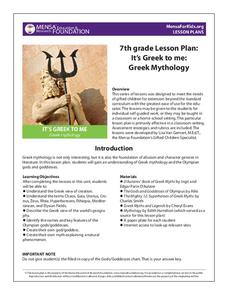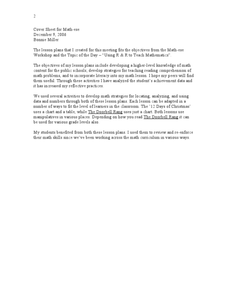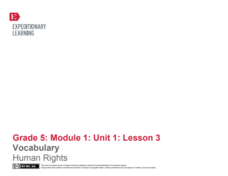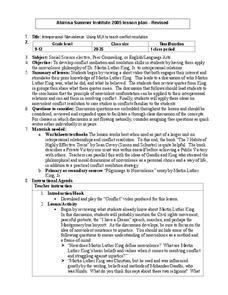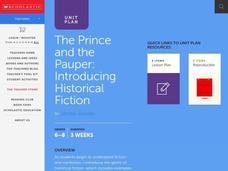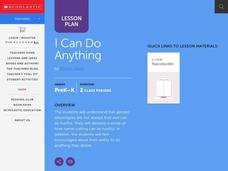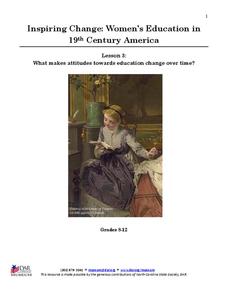Intersectional Black Panther Party History Project, IPHP
Teaching the History of the Black Panther Party: 5 Essential FAQ’s
What are the facts about the Black Panther Party? Was it, as J. Edgar Hoover contended, a terrorist organization and a threat to national security? Or a group of indviduals bound together by a desire to protect and nurture their...
New York City Department of Education
Colonial America and The American Revolution
How did the founding of the American colonies lead to a revolution? Use the essential question and sample activities to guide learners through a series of history lessons. Additionally, the packet includes effective strategies to...
University of California
Roots of the Cold War
When and how did the Cold War begin? To answer this question, you will not find a better-organized, in-depth, activity- and inquiry-based resource than this! Executing best teaching practices throughout, each portion of this inquiry...
Annenberg Foundation
America's History in the Making: Classroom Applications Three
How can primary sources bring history to life? Scholars create detailed lesson plans on the late nineteenth and early twentieth centuries in American history. The 17th installment of a 22-part program exploring American history examines...
MENSA Education & Research Foundation
It’s Greek to Me: Greek Mythology
It's no myth: this packet on Greek mythology is an excellent addition to your social studies curriculum. With writing activities, such as short answer responses and biopoems, and reading activities, which include creation stories and...
Curated OER
Twelve Days of Christmas--Prediction, Estimation, Addition, Table and Chart
Scholars explore graphing. They will listen to and sing "The Twelve Days of Christmas" and estimate how many gifts were mentioned in the song. Then complete a data chart representing each gift given in the song. They also construct...
Pearson
Unlocking and Exploring Folktales
Designed with many of the Common Core standards in mind, this 10-lesson unit is brimming with ELL strategies, teacher's notes, and the best of core instructional methods for teaching the common elements of folktales, and exploring...
EngageNY
Vocabulary: Human Rights
Your class continues to explore the history of the Universal Declaration of Human Rights. In addition to learning about the background of this text, learners work on the skill of identifying and understanding key academic vocabulary....
Curated OER
Artha: Strategies for Survival, Success, and Power
Students explain the concept of artha, recognize strategies that allow states to survive and see how elements useful in political science can be applied to getting ahead in everyday life.
Curated OER
Interpersonal Nonviolence: Using MLK to Teach Conflict Resolution
Students develop conflict mediation and resolution skills by applying the nonviolence philosophy of Dr. Martin Luther King. In this conflict resolution instructional activity, students watch a video about Dr. King and review quotes from...
Curated OER
Advertising
Students explore the advantages/disadvantages of advertising and all it entails for the consumer. Public relations is examined in depth. In addition, media, slogans, promotion and elements of print and color are examined in detail.
Curated OER
Building a Better Argument
Students create good arguments by exploring the basic structure of an arguments. They determine premises and conclusions for analyzing the effectiveness of arguments. In addition, they explore the differences between arguments and...
Curated OER
Ideal Weight, Cultural Stereotypes, and Eating Disorders
Students explore the societal stigma that accompanies people who are overweight. In addition, students research current medical thinking on "ideal weight" and identify how the perception of body image can lead to eating disorders.
Curated OER
The Insurgency In Iraq: A Quandary for the U.S.
Learners read articles, conduct Internet research and participate in a mock debate to explore the pros and cons of withdrawing from Iraq or remaining in conflict with the insurgency. They consider the difficulties of consensus building...
Curated OER
The Prince and the Pauper
Mark Twain, the famous American author, is often studied in the school system. Use "The Prince and the Pauper" to analyze the differences between the text and its video version. This lesson includes several culminating project...
Curated OER
I Can Do Anything
Students investigate what boys and girls can do after participating in readings and class discussions. They examine how gender stereotypes and name-calling can influence what students think they can and cannot accomplish.
Curated OER
Ofelia Romero The Maya Culture and Civilization
Fifth graders investigate the Mayan culture, number system, alphabet, hieroglyphics, history, civilization, artistry, and sports in this series of lessons.
Curated OER
Business Ownership: Private Sector - Lesson Plan: 2 x 1 hour lessons
Learners study different forms of business ownership. They examine advantages and disadvantages of different forms of business ownership and the appropriateness of different forms of business ownership. They study how business ownership...
Curated OER
Lesson Plan: The Net Neutrality Debate
Should Internet users who send data-heavy content pay higher fees than those who are involved in activities, like sending an email, that have less content? This question is at the heart of the Net Neutrality debate. After watching a PBS...
Curated OER
Ban That Book!
Take advantage of Banned Book Week to pique students' interest and get them reading! Create a classroom display of previously banned books and allow each member of your class to choose one to read. After they have read their book, get...
Curated OER
Should the Ming End the Treasure Voyages?
During the first century of Chinese Ming dynasty (1368-1644), the government sent out a total of seven voyages into the Indian Ocean. Young historians will discuss, explain, role play, and compare the decisions made by rulers during the...
Daughters of the American Revolution
Lesson 1: How Do Society’s Expectations Influence Education?
The history of women's education can be traced back to the delicate stitching of student samplers from the 19th century. Modern-day pupils examine and analyze four primary sources, three of which are images of embroidered samplers, which...
Daughters of the American Revolution
Lesson 2: How Do We Determine the Value of Education?
Have women always had the same educational opportunities as their male counterparts? Young historians read an 1819 essay by Emma Willard on the state of female education in the 19th century before discussing their views regarding women's...
National Society Daughters of the American Revolution
Lesson 3: What Makes Attitudes Towards Education Change over Time?
The struggle for women's rights is not unique to this generation, or even to the 20th century. Class members explore the conflicting opinions of Alexander Graham Bell and his wife, Mabel Hubbard Bell, regarding women's pursuits of higher...




